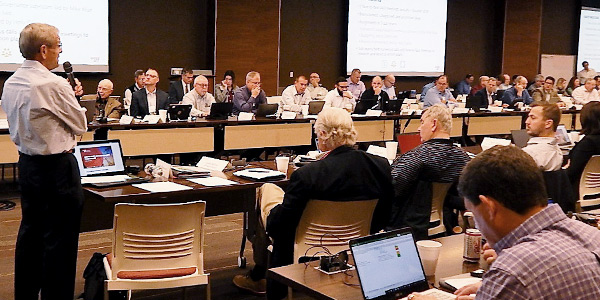By Tom Kleckner
LITTLE ROCK, Ark. — SPP Chairman Larry Altenbaumer last week took the wraps off an eight-month value and affordability study conducted behind closed doors.
Altenbaumer, who created and chaired the Value and Affordability Task Force, presented a high-level overview of the group’s final report to both the Markets and Operations Policy and Strategic Planning committees.
“I thought we might find some silver bullets … $10 million, $20 million in savings,” Altenbaumer said. “Nothing that came out was that discrete, but we found certain attributes already with SPP that we can enhance.”
Instead of spotting areas of big savings, the report more modestly “supports continued efforts for broad-based process improvement” and “identifies meaningful opportunities to enhance other aspects of performance.” Those opportunities include refining analytics, tailoring information for individual members and improving stakeholder engagement, transparency, metrics and communications.
“While you can’t put a dollar value specifically on any of those items, I’m convinced that in three or five years, we’ll be a more effective, efficient organization,” Altenbaumer told the SPC. “While this initiative may have turned out a little different than expected going in, I’m happy where we landed with this thing.” (See “Altenbaumer Continues to Exert his Influence” in SPP Strategic Planning Committee Briefs: Jan. 16, 2019.)
The VATF defined affordability as “the degree to which a member can justify the financial, human-resource and time-related costs of SPP’s services, relative to viable alternatives.” It defined value as “the tangible and intangible benefits of SPP’s services weighed against associated costs and transmission investments.”
The report’s recommendations are broken out into three main categories, including those affecting the value of SPP and its transmission, the functioning of stakeholder groups and services and internal processes. They include improving the budgeting process by involving “appropriate” stakeholder input, including more transparency into the total costs and working with stakeholders to improve the usefulness and credibility of a value-of-transmission study in 2021.
“There is, candidly, a credibility issue when SPP issues a report on something,” Altenbaumer said. “Many of these initiatives speak to things we can do to make our processes more transparent. Stakeholder engagement and collaboration was another attribute that was emphasized.”
Members recalled recent transmission-value studies trumpeting SPP’s 14-to-1 return on every dollar members contribute and the benefits from $3.4 billion of investment during 2012-2014. (See SPP Begins Promotional Campaign to Tout Transmission Value.)
Some members have seen those reports used in regulatory proceedings.
“Reports can be misconstrued,” said Southwestern Public Service’s Bill Grant, who interacts frequently with regulators. “It needs to be worded such that the money spent on the project is providing value, but it’s value over time. Not that we’re saving X amount of money. It needs to be specific that, yes, we built this transmission, it adds this much value and will continue to add value over the next 40 years.”
“One of the things we need to do is better tailor that message from the eyes of our stakeholders,” Altenbaumer responded. “We don’t want what we put out there, even though it may be technically true, to be the basis for misinformation or misunderstanding.”
“This will help everyone on both sides of the equation,” said Oklahoma Gas & Electric’s Greg McAuley. “The input we’ll have in producing the scope of that [transmission] report and how it gets communicated afterward … going forward, we have an opportunity to make that work.”
One of the VATF’s three sub-teams spent considerable time looking at SPP’s cost areas, which included staffing and benefits, IT costs, meeting costs and transmission-study impacts and costs. The team found IT and human resources represent about 70% of SPP’s operating costs, Altenbaumer said.
“We can better engage members with respect to the priorities of the activities and projects being undertaken by SPP,” he said.
The SPC accepted the report, which will next be presented to the Regional State Committee and then the Board of Directors for final approval on Oct. 29. The SPC will oversee the recommendations’ implementation.






